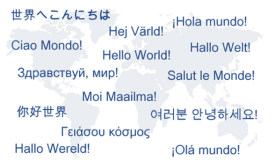language learning
The Hafez Association in the Armenian capital of Yerevan organized a meeting of its learners of the Persian language on Tuesday. [...] “One of Iran’s main concern is to stimulate the development of the Persian language in Armenia,” Iranian Ambassador Seyyed Kazem Sajjadi said at the meeting.
Four alumni of the State Department's NSLI-Y program use the popular messaging icons to explain a few words in Mandarin.

“Treknie gadi (the fat years) – tas jums tiešām ir jāzina (that one you really have to know),” said the Latvian teacher, and, for the next two hours, our language class dissected those two words. We read in Latvian about Prime Minister Aigars Kalvītis and his famous 2005 speech to the nation promising a modern incarnation of Jacob’s biblical prophecy of seven ‘fat years’ of prosperity followed by seven years of hardship. We learned pārpalikums (surplus) and dižkibele (global financial crisis).
English tends to be conceptualised as a monolithic entity, more like a planet than a galaxy. We talk about ‘the’ English language, ‘the’ grammar of English, and ‘the’ vocabulary of English, as though it was all one neat system. But linguists have long understood that this is no more than a convenient fiction. In the 21st century, the global diversity of Englishes and uses of English is revealing that the fiction can be rather inconvenient on many levels, especially in parts of the world where native speakers are scarce.







